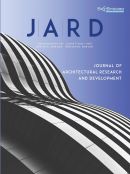Abstract
The most crucial notion in built environment studies, space, is forced to undergo a reinterpretation due to the influence of numerous social phenomena and cultural movements, such as postmodernism, the information age, and globalization. The traditional concept of time subverts time division and space restriction, along with the changes brought on by contemporary urbanization and postmodernist cultural norms. As a result, the urban plaza area, which is a unique cultural space, begins to take shape. It brings together previously different places, such as “public and private,” “political and daily,” “working and leisure,” as well as “physical and virtual.” The urban plaza is a useful research subject since it is a public area where the majority of cultural traits associated with urbanization are found. The spatial politics of the urban plaza experience a historic shift from macro politics to micro politics under the influence of postmodernism. Premised on this notion, the purpose of this study is to investigate the specific space of today’s cities, which is the urban plaza, as well as the politics of space and the in-depth interpretation of space culture. This study uses techniques from many other fields that are related to spatial ideas, including philosophy, political science, cultural studies, and geography. This study expands the cultural space of post-modernist interpretation of cultural depth of character based on the theoretical paradigm in multidisciplinary cross-application in order to enhance individuals’ awareness of urban plaza cultural forms and further their understanding of its political and cultural space power traits as well as underlying meaning. This paper examines the role and culture of urban plaza from the perspectives of numerous well-known spatial culture theories in the context of the analysis. In addition to identifying the nature of the cultural politics, this paper addresses the significance of spatial politics of urban plazas.
References
Liu S, 2008, Citizen Plaza and Urban Space Production. Gansu Social Science, 2008(3): 50–52.
Harries K, 1998, The Ethical Function of Architecture, MIT Press, London, England.
Shao Z, Cao R, Zai J, 2004, City-Culture-Architecture. Urban Issues, 2004(6): 8.
Crampton JW, Elden S, (eds) 2012, Space, Knowledge and Power: Foucault and Geography, Ashgate Publishing, London, England.
Foucault M, 2019, Texts/Contexts: Of Other Spaces, in Grasping the World, Routledge, London, England, 371–379.
Fiske J, 2010, Understanding Popular Culture, 2nd Edition, Routledge, London, England.
Chambers I, 2002, Popular Culture: The Metropolitan Experience, Routledge, London, England.
Soja EW, 1998, Thirdspace: Journeys to Los Angeles and other Real-and-Imagined Places. Capital & Class, 22(1): 137–139.
Fiske J, 1987, Television Culture, Law Book Co of Australasia, Pyrmont, Australia.
Gardiner M, 2014, The Dialogics of Critique: M.M. Bakhtin and the Theory of Ideology, Routledge, London, England.
Wang D, Niu Y, Lu L, et al., 2015, Tourism Spatial Organization of Historical Streets – A Postmodern Perspective: The Examples of Pingjiang Road and Shantang Street, Suzhou, China. Tourism Management, 48: 370–385.
Yu Y, 2002, Agora: Rejuvenation of Square Spirit. Planner, 18(11): 93.
Wirth JM, 2005, Nietzsche’s Joy: On Laughter’s Truth. Epoché: A Journal for the History of Philosophy, 10(1): 117–139.
Ward G, 1993, Lyric Poets in the Era of Late Capitalism, in Statutes of Liberty, Palgrave Macmillan, London, 135–176.
Dai L, 2010, We Fall in Love with the Place We Hate. Vision, 2010(2–3): 14–15.
Habermas J, 1991, The Structural Transformation of the Public Sphere: An Inquiry Into a Category of Bourgeois Society, MIT Press, Massachusetts.
Lefebvre H, 2012, From the Production of Space, in Theatre and Performance Design, Routledge, London, England, 81–84.
Crang M, 2008, Cultural Geography, 2nd Edition, Routledge, London, England.
Billingham CM, Kimelberg SM, 2013, Middle?Class Parents, Urban Schooling, and the Shift from Consumption to Production of Urban Space. Sociological Forum, 28(1): 85–108.
Lachmann R, Eshelman R, Davis M, 1988, Bakhtin and Carnival: Culture as Counter-Culture. Cultural Critique, 1988(11): 115–152.
Smilde D, 2004, Popular Publics: Street Protest and Plaza Preachers in Caracas. International Review of Social History, 49(S12): 179–195.
Morton IJ, Johnson J, 2019, Planning for Hospitable Public Spaces and the Changing City: A Content Analysis of the City of Sunderland Unitary Development Plan. Hospitality & Society, 9(3): 267–290.
Watson S, 2013, City Publics: The (Dis)Enchantments of Urban Encounters, Routledge, London, England.
Berney R, 2010, Learning from Bogotá: How Municipal Experts Transformed Public Space. Journal of Urban Design, 15(4): 539–558.
Cavallaro D, 2001, Critical and Cultural Theory, Continuum International Publishing Group, London.
Mumford L, 1998, The City in History: Its Origins, Its Transformations, and Its Prospects, Fine Communications, New York.
